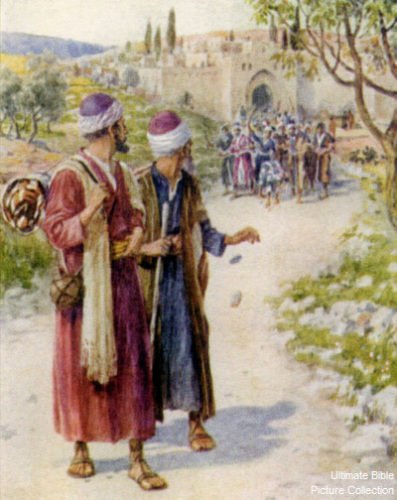A sermon preached on Acts 15:36-41 at University Christian Church, Hyattsville, MD
We love reading, watching or singing along to love stories, don’t we?
Maybe this is this why our reality show line up is full of finding love elements of their programing...
Big Brother, 90 Day Fiancé, Married by Mom and Dad, Say Yes to the Dress, anyone?
And let us not forget the show running now for 15 years, The Bachelor.
The Bachelor has proven to the be a franchise built upon viewers being sucked into to following an unrealistic 6-week journey across the world by a bachelor or bachelorette to “find love” but also to follow the journey of those who go home in defeat. When a contestant does not receive a rose “and is sent home” a limo or a back SUV appears and whisks him or her off to the airport. But this is not before a camera crew gets in the car with the sullen contestant.
And what follows? Viewers at home see all the emotions including pure sadness.
(Grown men bawling and young women with their mascara dripping down their face and their eye lashes falling off. And we all wonder do they realize millions are watching?)
And the Nielsen Ratings say about The Bachelor/ The Bachelorette that the more dramatic the break-up the more we are watching.
Bottom line: if this reality show has any mirror to reflect back what we find worth giving our time and energy toward, it is a good break-up story.
And so, then, listen closely church. What we have before us this morning is a good, a very good break-up story. A pair that may thought were a ministry match made in heaven has a falling out.
Our lesson from this morning is taken from the Acts of the Apostles. We know that after Jesus ascended into heaven, charging the disciples (and all those to come) with the great commission:
“Go ye therefore into all the world and preach the gospel. . .” and they had work to do!
And as the days of the lives of the apostles go, by time we reach chapter 9, we encounter a huge shift in the narration.
Saul, a known persecutor of followers of Christ and member of the Pharisee religious order, meets Jesus literally on the road to Damascus. What follows is one of the most dramatic conversions—Saul, the person you’d least expect to find himself on team Jesus—goes there, all there. Saul commits his life to service in telling others about Jesus.
But as you might imagine, so many have a hard time accepting him in the Christian way. I mean, Saul (who changes his name to Paul) says he’s a changed man? No way.
But not Barnabas.
Barnabas, a leader in the early Christian movement in Jerusalem, a leader whose name meant literally “Son of Encouragement” believed in Paul.
He trusted the testimony of Paul.
He blessed the change in Paul.
And he stood up for Paul when Paul sought out support from the gathering of believers in Jerusalem.
As the men go their separate ways, Paul back to this hometown of Tarsus and Barnabas as a leader in the church in Antioch, the two can’t be kept from one another for very long. In Acts 11, we read of Barnabas calling for Paul asking him to come with him to Antioch. The church needs a strong preacher and Barnabas thinks that Paul would be just the person for the job. Together, Paul and Barnabas did ministry together in Antioch for one year, scripture tells us.
And a couple of chapters over, we read of that the good times continue to roll.
The church in Antioch commissions Paul and Barnabas to take the first major missionary journey.
When I traveled to the Middle East on an interfaith delegation of clergy several years ago, our guide told us something about traveling companions that I have never forgotten.
Aziz said us that you never truly know someone until you travel with them.
Any maybe if you’ve taken any road trips with friends or family this summer you’d agree. For there’s nothing like being trapped in a car (even with headphones) with the same people for hours on end or sharing a one room hotel room to make you feel like you're ready for your own bed again.
I have to think the same was true for Paul and Barnabas. Trapped together in a boat, in side-by-side tents, and walking side-by-side for weeks, they knew one another. They preached together. They taught together. They organized together.
As a preacher/ teacher/ organizer who has also worked throughout my ministry with those who also preach/ teach/ organize, I have to tell you that this kind of work when done together, when done together with the blessing of the Spirit, can be a heart-knitting, a soul-binding season of life like none other. When you do this kind of work with people, you can’t imagine ever-growing a part.
BUT, Acts 15, verse 36 tells us of the conflict brewing below the service of this partnership made in heaven between Paul and Barnabas.
Paul is ready for round 2 telling Barnabas that he wants to “return and visit the believers in every city where we proclaimed the word of the Lord and see how they were doing”
But Paul says no. Barnabas wants to take John Mark. Paul doesn't believe John Mark is a good choice.
The two simply do not see eye to eye.
The great break-up is underway.
Whether it was over personal differences (about John Mark’s readiness for service) as Acts narrates it. Or if it is over theological differences as Paul highlights in his own voice in the letter to the church of Galatians—we aren’t fully sure.
The point is that the two had a “sharp disagreement” a phrase that in the original Greek signifies a passionate or even bitter exchange.
And if you’ve had a sharp disagreement anytime in your life (and I’m sure you have) you know that you just don’t move forward too easily after having one.
Paul and Barnabas were no different. They don’t get back together. Never in scripture do they get back together. 
When I first chose to study and preach on this passage this Sunday several weeks ago, I thought about the great mystery of relationships in this crazy world of ours. How someone can walk in our lives as a friend and become a dear one, even a “best” and then one day, say “see ya” with all the complications that follow.
I thought of all of the broken partnerships in our world. Long term dating relationships that end with rivers of tears. Marriages of 5, 10, 15 or 35 years that find their conclusion in the word divorce with blame slung around with never-ending speed. No one gets back together.
I thought of how in the Christian church we so tightly hold on to words like “reconciliation” and “unity” and “peace-making.” But here in this portion of scripture we get none of that. No reconciliation. No unity. No peace.
I believe there’s so much wisdom this text offers us WHEN splits happen in our friendships, our partnerships or even our churches.
For like Paul and Barnabas—when we find ourselves in a “sharp disagreement” with another person, institution or group sometimes the healthiest, most life-giving and fruit-bearing ministry we can do going forward is to SEPARATE from those who do not understand why we do what we do.
But on a morning like this. On a weekend like this. When Charlottesville happened . . . this sermon has to go a different direction than I might have planned to end it.
When hate filled the streets of a city in a state right next door to us . . .
When flags of regimes, we long thought were dead were raised in supremacy of a race killing at least 3 and injuring dozens more . . .
When marchers, many who will fill the pews this morning at churches with the same word “Christian” on the door as is on ours, rallied to say that brown lives and black lives did not matter . . .
When the highest leader in our land did not call out racism for the evil that it is . . .
It seems right to say this morning to have a family meeting. Come close church. It's important to remind one another that there comes a point when we cannot be silent.
For as Christian people, we believe with all our hearts, don’t we that we are ALL God’s children. No matter where we were born. No matter what the color of our skin is. No matter who we choose to love. We are ALL CHILDREN OF GOD. And with this true, there’s no room in our faith tradition, or in this community, or in our country for hate for anyone. There just isn’t.
Those people marching with Nazi t-shirts on aren’t our people.
I know, friends, we don’t like rocking the boat, especially when it comes to our closest friends and family whom we respect and have long-standing relationships with. We don’t like being seen as partisan or even judgmental.
I know friends, we believe in the prayer of Jesus in John 17 when Jesus prayed with all his might that “all of us may be one” . . .
BUT in the spirit of our text this morning (knowing that breaking-up can be one of the most spiritual things we do—even with members of our own tribe), we must break-up from hate.
We must break-up from any voices that don’t call acts like this weekend what they are: sin.
We must not idolize false unity, just for the sake of unity.
We must stand firm—knowing that our calling to strengthen others might just be to strengthen ourselves for the days that lie ahead . . . days when Charlottesville is not just somewhere out there. But here. Right here. In Washington DC. In Hyattsville. In our own backyard.
Elie Wisel, survivor of the Holocaust said this about silence (or another word for what I like to call the refusal to break-up):
“I swore never to be silent whenever human beings endure suffering and humiliation. Silence encourages the tormentor, never the tormented.”
So, what will we do?
Will we be a part of an institutional break-up from hate, from racism, from anything that keeps the message of belovedness away from ANY person?
Will we have that courage to be ok to separate, as now the time that time has for sure come?
Or will we be silent?
I hope not. Pray not this day.
Let us boldly break-up.